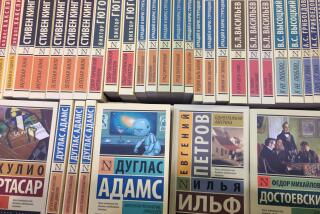Looking to a Post-Cold War World : Our 40-Year Competition Must Yield to 21st-Century Realities
- Share via
Ronald Reagan has pronounced the Soviet Union a former evil empire and has called Mikhail S. Gorbachev his friend.
But the political relationships between the superpowers and the global military deployments undergirding the Cold War remain essentially undisturbed. Gorbachev called the summit a “missed opportunity.” In fact, the meetings accomplished about what most people expected. The tragedy is that expectations were so low.
The Cold War is over, but American leaders lack the imagination to turn this new reality into policies that serve our national interest. They seem unable to envisage a post-Cold War world.
The principal conditions that more than 40 years ago precipitated the deadly contest have fundamentally changed. The Soviet Union is not the secretive, paranoid and totalitarian state that it was in Stalin’s time. Europe is politically stable; in 1992, when the last tariff barriers in the European Market come down, it will become an economic superpower. The declining Communist Party of Italy has not been a Soviet asset for years, and the French Communist Party has shriveled into insignificance.
Nor is the Third World vulnerable to communist ideology that George F. Kennan once called the fig leaf of Russian expansionism. Nikita S. Khrushchev’s boasts about the triumph of communism in the Third World have been replaced by a more sober assessment of Soviet interests. Ethiopian generals and Afghan intellectuals who read Marx and seek Soviet aid proved to be expensive and unreliable clients. In Afghanistan the Soviets learned some of the sobering lessons of Vietnam. For the superpowers there are political constraints on making war--even against very poor countries.
The economic burden of the arms race and the crisis of leadership in Soviet society have led to what appears to be a major reassessment of the Soviet Union’s national interest. An equally searching reassessment of the American national interest is overdue. These historic changes in the Soviet Union by themselves would dictate a major shift in American foreign-policy assumptions and strategies, most of which are now 40 years old. On the threshold of the 21st Century, even more important changes are taking place that have littleto do with the Soviet Union. But these changes threaten the security of the coming generation of Americans more than anything that the Soviets can do short of their committing nuclear suicide: America’s increasing dependence on a world economy over which it exercises less and less control, chronic stagnation of world trade, and the prospects for catastrophic environmental damage compounded by economic disaster in Africa and Latin America.
The new security threats to the United States are rooted in far-reaching economic and environmental changes and in the fact that great powers no longer find it so easy to translate military power into political advantage. Without a radical shift of focus, priorities and resources--financial and intellectual--the United States will remain mired in the Cold War and will suffer the usual fate of generals who prepare for battles of bygone days.
The United States desperately needs a new vision of the real world around us, what we can realistically hope to achieve in foreign policy in the pursuit of American values. It needs a strategy for dealing with the strange new century that is almost here. Only in this context can we decide what sort of a relationship with the Soviet Union is desirable or possible. In short,we need a clear sense of the terms on which we would end the Cold War.
But for almost half a century the vague, shifting and unremitting struggle with the Soviet Union has been the organizing principle of our national life. We have used the Soviet Union as the great simplifier around which we have defined virtually every foreign-policy issue that we consider important, from Central America to South Africa. We have used this enemy to solve or to ignore our domestic problems. We have built interstate highways, appropriated money for science teaching, built islands of prosperity with defense contracts and sent men to the moon--all in furtherance of our struggle with the Soviets. We are still so paralyzed by our long competition with the evil empire that we are now unable to put forward our own proposals on such matters as substantial conventional disarmament, a new security arrangement in Europe, regional settlements in the Persian Gulf and Southern Africa and the revitalization of the United Nations, even though we face the likelihood of dramatic Soviet initiatives in these areas.
President Reagan once told the Soviet leader that the Cold War would end when the two superpowers joined forces against Martian invaders. What if the Martians have a different agenda? Can we face the next century without the comforting familiarity of the ever-present Soviet enemy?
More to Read
Sign up for Essential California
The most important California stories and recommendations in your inbox every morning.
You may occasionally receive promotional content from the Los Angeles Times.













